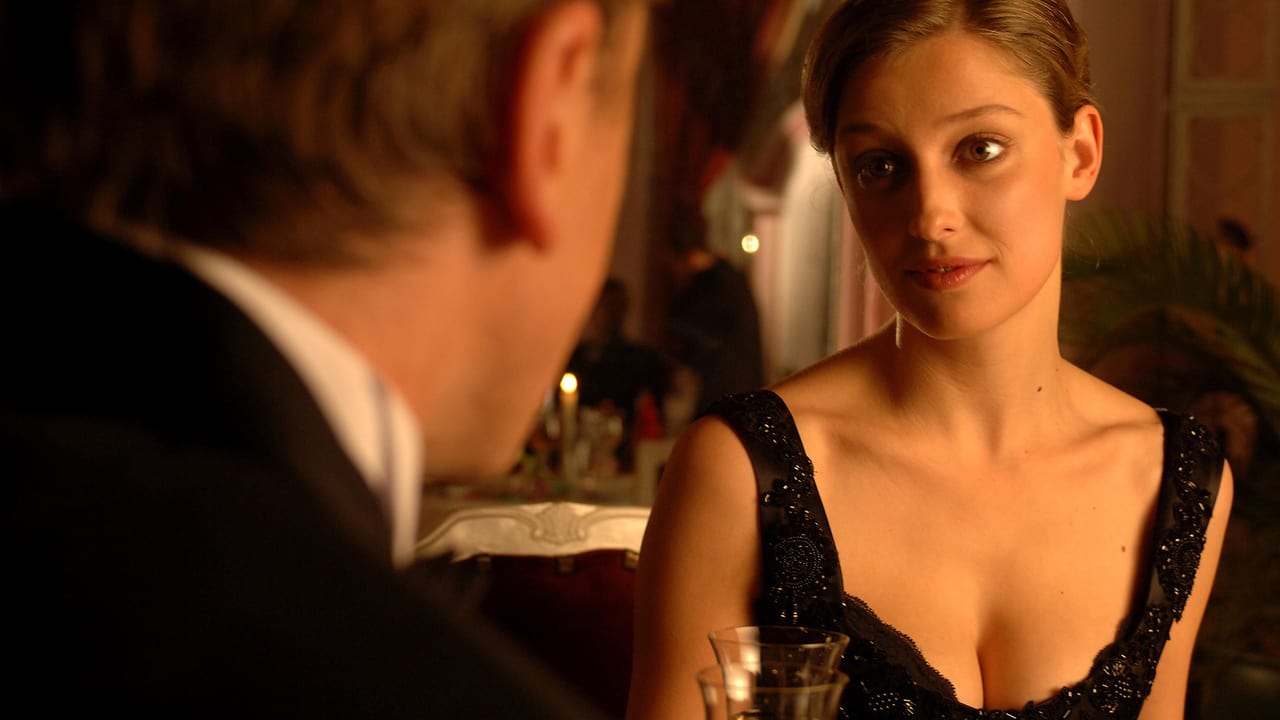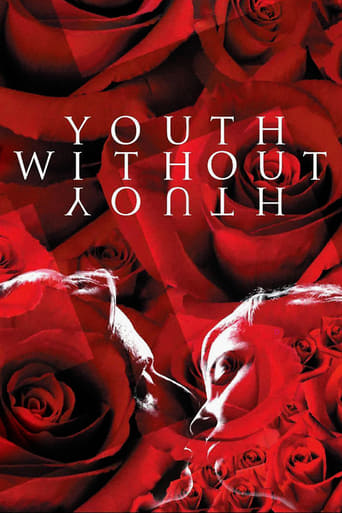

10 years without directing a movie and then Francis Ford Coppola returns with "Youth Without Youth". But it was a disappointing return considering that his daughter Sofia directed the brilliant "Lost in Translation" and his other son Roman directed the nostalgic film "CQ" (run to watch this film NOW). I don't know what happened to the talented director of movies like "The Godfather" trilogy and "The Conversation" but I know this: he tried hard, made a few good things but in the end the result was overshadowed by a messy and confusing plot where the dramatic suspense was more interesting than the romance told in the second half of it.The amazing Tim Roth plays an 70 year-old linguistic that after being struck by a lightning starts all of sudden to get younger and he has the chance to do all the things he wanted to do as younger including finishing a book (we never know what is the so-called work of his life). But this linguistic happens to be in Europe during the 2nd World War and the Nazis want him after discovering what happened to him, and they want to know what more thing he can do. Roth is helped by a medical doctor (Bruno Ganz) to escape to another countries, disguised and not only that: he has some incredible powers such as speak and write in all possible languages and mind-controlling (that appears in a scene where he makes a Nazi scientist shoot himself), and he talks to himself divided into another person (remember John Lithgow in "Raising Cain"? No? The bad twin and the good twin. Here Roth has an good side but he's able to talk to his "bad" ? negative side). Until this part where he's running away from all kinds of danger the movie works very well. Then...There's a boring and endless romance between the main character and a young woman (Alexandra Maria Lara), he knew that woman earlier in his life and now she returned also hit by a lightning and speaking in some dead Indian language. The mystery is good except for the excessive use of philosophical thoughts about life, death, experiences and other things. The romance was unconvincing, I didn't feel empathy for the actors at this point, and by the time they're old again (for no reasons at all or I blinked and missed something) the movie was ruined. I haven't read Mircea Eliade's novel and I don't know what was good about it to make it transformed into a feature film but I know this: The story had great potential but if it were filmed by David Lynch. It is an very surrealistic story something that Coppola is not used to do. But Coppola didn't ruined the movie, perhaps just a few parts of his screenplay that didn't match well. As a director he made a great technical film, with good art direction and a beautiful cinematography; but the screenplay could've been more easy to follow, less difficult to put the parts together and explain a few things. When Tim Roth manages to control the actions of the Nazi scientist who wanted to kill him the movie (or the book) could point to other direction and make of the main character a hero instead of a egoistic character that only wants to write his book and learn more and more about things. Performances were okay here, Roth was good; Bruno Ganz even better; and Alexandra Maria Lara was unmemorable, can't sure quite why; and there's a good special appearance by Matt Damon. In the end the title "Youth Without Youth" reflected that despite getting young (Youth) and have a chance to make different things doesn't necessarily means to be a greater person and/or to have a uncomplicated life. This thirsty for knowledge only made the character a lot older on his inside (Without Youth). In simple words: a movie with a similar theme is better when someone builds a time machine. When a lightning strikes you probably are going to be too much reflexive on things and end up doing nothing. 5/10
... View MoreA note first on style, to me, Youth Without Youth, is one of the most gorgeous modern films, it's one of the few films where the production team are exerting control to the extent when they can be described as using a palette. In this case the colours orange and blue predominate beautifully. There has been some suggestion in modern criticism, particularly in Sight & Sound, that "orange & teal" is a ugly fad that no-one will miss, I think Youth Without Youth is definitely deserving of special treatment. Certainly the blue here is less dingy than elsewhere in the "orange & teal" canon. The film is about a once brilliantly gifted scholar, Dominik Mattei (played by Tim Roth), who appears to have wasted his life, and is now an old man, when suddenly he gets a second chance and returns to youth. The film is interesting, how did he waste his life? Is it because he didn't complete his life's work, a great book which was to contain a grand unifying theory on consciousness and the origins of language, or because he didn't pay enough attention to his beloved Laura?There are two main points of interest in the film for me, one relates to the allure of the situation Mattei is in and the dilemma it presents, and the other to the structure. As a teenager I read Daniel Keyes' 1959 novella Flowers For Algernon, which, in two different forms, has the rare prestige of having won both of science fiction's key writing awards, the Hugo and the Nebula. It's about an experiment performed on Charlie, a man with a very low IQ, who as a result of the experiment, progressively becomes the most intelligent man alive. At one point he criticises the scientist who performs the experiment, mentioning that the best rebuttal of his theories yet written has come from India. The scientist says he has not ever heard of the document which he discovers was written in Hindustani, and which he was therefore not in the position to read anyway. Charlie records, "I asked Dr. Strauss how Nemur could refute Rahajamati's attack on his method and results if Nemur couldn't even read them in the first place. That strange look on Dr. Strauss' face can mean only one of two things. Either he doesn't want to tell Nemur what they're saying in India, or else - and this worries me - Dr. Strauss doesn't know either."One key point of Flowers For Algernon, and also this film, is the allure of supernatural intelligence: what would our thoughts be if we had IQs in the thousands and could read books at a glance? The key tone of the Flowers is sadness, as we find that Charlie's new found faculties are temporary in nature and subside gradually. This tone dovetails with the film as well, because another of the key features of both artworks is the conflict between intellect and emotion. Is it more important to love, or to embrace aloof intellectual pursuits? My slanter tells you all you need to know about my position! In any case it's a very sad story, and I believe that is the heart of Youth Without Youth as well, it's an elegy.The parts of the film where senile Mattei is shown are very poignant and remind me of Mr Blank from Paul Auster's book Travels in the Scriptorium. Both men are vaguely aware of their past mistakes, and also both men are utterly alienated. A kind of tender nastiness pervades these bits if that isn't too oxymoronic. Francis Ford Coppola has mentioned his identification with Mattei, particularly regarding his failure to complete his sci-fi project Megalopolis.My other point concerns the structure. There's a passage towards the end where the Mattei describes an oriental tale of a dream where a prince dreams that he is a butterfly which dreams it is a prince, who dreams he was a butterfly (et cetera). It's not clear in this film just which parts are dreamt, and which not, or whether that matters. It's more that the overall aesthetic conception of Mattei's story of the prince and the butterfly is what matters. In this sense it is similar to the Saragossa Manuscript or the 1001 Arabian Nights, where it is, to a large extent, the structure itself that intoxicates.There is also the issue of familiar to readers of Watchmen, of whether demi-god powers should be used for good or evil (whether indeed it is right to interfere in human destiny at all), or whether they should be directed internally towards solipsism. This makes Roth is well cast, he is a typecast baddie, and this aura of badness here allows this ambiguity to take root. The film also sounds wonderful, and this is mainly due to the ethereal tone of the cymbalom. If you liked Tim Roth in this film I suggest you watch another movie in which he stars, The Legend of 1900 directed by Giuseppe Tornatore, which is also wonderful in a similar enigmatic way.And this review is dedicated to Claire, who is the first rose.
... View MoreI was not very interested in watching Youth Without Youth, despite being director Francis Ford Coppola's first film in 10 years (if we do not consider his anonymous "contribution" to the atrocious Supernova).I liked various movies from this legendary filmmaker very much...not the ones he made as a mercenary director (like Jack or Peggy Sue Got Married), but the most personal ones (like Rumble Fish or Tucker: The Man and His Dream), where he was obviously interested in the material.But the negative commentaries Youth Without Youth received made me not to be very interested in watching it, because I did not want to find another great director reduced to a mere shadow of his previous energy (like it happened to me with Oliver Stone and Alexander, Steven Spielberg and Indiana Jones and the Kingdom of the Crystal Skull, John Carpenter and Ghosts of Mars, and a very long etcetera).However, Youth Without Youth was released in my country, and since I had some free time and due to a schedule coincidence, I decided to watch it.Unfortunately, all the negative commentaries were right: Youth Without Youth is a confusing, hollow and terribly boring mess, and I think this is the lowest point in Coppola's career so far.The story of this movie is complicated, but not on the interesting way which challenges us to unravel the mysteries of the narrative (like it would may happen on a film directed by Jim Jarmusch), or complicated in the sense of director David Lynch's delicious style, which invites us to draw conclusions and enjoy a dream-like experience.Youth Without Youth is complicated on a horribly tedious way.Besides, this film is full of forced and arbitrary philosophical, linguistic and literary discussions.In summary, Youth Without Youth is an unbearable experience, and my recommendation is for you to stay away from it.I still cannot believe Coppola was the responsible of this mess.
... View MoreI'm stupid enough to be really honest here. I didn't completely understand all of the film. I didn't. I know the film is about perception and time but there is more here and I'm human enough to say I can't quite put it all together. The acting is excellent. The photography beautiful. The locations used were fantastic. I did enjoy the film but I really didn't find it all that engaging. Perhaps that is because I didn't grasp all of it. Not a bad film by any means but it got a little bit weird in certain parts and I don't think everyone is going to love it. I'm glad I saw the film but wouldn't sit through it again.
... View More